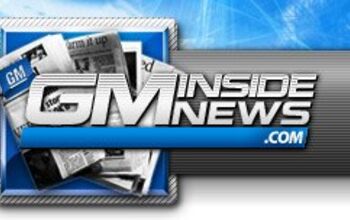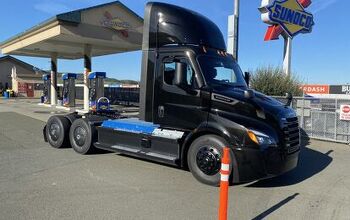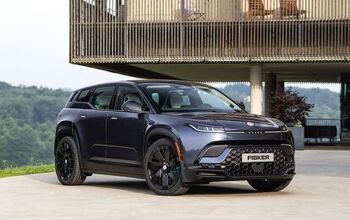Tesla Stans Can't Handle the Truth

Last week, we reported about a crash in the Houston area involving a Tesla Model S – a wreck in which authorities claim there was no one in the driver’s seat at the time of the impact.
It’s unclear if the car was equipped with Tesla’s Autopilot autonomous-driving system, and it’s also unclear if the authorities’ claim has been verified (The Verge reports someone may have been in the driver’s seat after all). Still, there has since been debate over whether it’s even possible for Autopilot to be defeated in such a way that someone could leave the driver’s seat.
Consumer Reports did what it does – it tested a Tesla with Autopilot to see if it was defeatable. The car used was a Model Y, but the system is the same, and CR found that yes, indeed, one could defeat Autopilot’s safeties – the ones that are meant to make sure the driver’s seat is occupied.
In a sane world, the reaction would be something like this: “We don’t know if Autopilot’s safeties were defeated in this incident – we don’t even know if this car had Autopilot – but it is theoretically possible and Tesla needs to fix that issue.”
We don’t live in a sane world. Especially when it comes to Tesla. At least not if what happens on Twitter is even remotely representative.
As usual, Tesla stans came out of the woodwork to attack CR’s Jake Fisher and otherwise defend the company. As if nothing could ever, ever be Tesla’s fault.
Again, to be absolutely clear, we don’t know if Autopilot had anything to do with this crash. And Consumer Reports made it clear that they were only showing that it was possible to defeat Autopilot, and not suggesting that Autopilot, or an attempt to defeat Autopilot, was any way involved in the Texas crash.
But once again, the Telsa cult struck on Twitter. Because their favorite brand can do no wrong in their eyes. And because Tesla’s CEO, Elon Musk, can be a bit of a troll.
My Week:
News: Police report nobody in the drivers seat in crash.
Twitter: That’s impossible!
CR: It's possible.
Twitter: How can you say car is defective?!?
CR: Never said that. But a change would make it safer and work better.
Twitter: FUD!!
— Jake Fisher (@CRcarsJake) April 24, 2021
Put aside what happened in Texas – if CR’s testing holds true for all Teslas, it’s a safety loophole that needs to be fixed. Perhaps with cameras that monitor driver-eye movement, but our own Matt Posky points out that there are data-privacy issues at play, and when other automakers call out Tesla, they have their own self-interest in mind.
Regardless, Consumer Reports was simply performing one of the purposes of journalism – to hold companies and people to account. In this case, that means testing for a safety problem, finding one, and reporting on it. I wish more auto-journalism outlets had the resources to do that sort of testing, as it would help ferret out more issues across the industry.
Yet, Tesla fans take anything that reflects on the brand negatively as a personal attack. It’s not just random fans online – Teslarati ran an opinion piece taking CR to task for doing what journalists are supposed to do.
A piece that is a masterclass in bad faith. Teslarati’s Simon Alvarez argues that what CR did in the process of its testing would be illegal on a private road – and while that’s true, CR was using a private test track because it wouldn’t want to break laws or be unsafe during this kind of test.
Never mind that people can and do break laws – and may have in Texas. Alvarez then claims that what CR did wasn’t as “easy” as the article claimed and then follows with a disingenuous argument that presupposes any determined person could trick any driver-assist system.
To which we say, “no shit, Sherlock”. And way to deliberately miss the point. CR wasn’t trying to argue that other driver-assist systems are foolproof, just that Tesla’s system was more easily tricked than others they’ve tested. By the way, the “you didn’t test the others!” argument was also leveled at CR, but Fisher clarified on Twitter that his outlet has tested competing systems. This argument is also disingenuous, as CR ran this test because of the hoopla surrounding the possibility of Autopilot’s safeties being involved in the Houston crash.
https://twitter.com/MrNeffels/status/1386074972259487746
Our boy Simon then goes even harder for the bad-faith gold by claiming that well, of course just anyone could put a brick on the gas pedal of a car without an autonomous system! Never mind that the criticism is being specifically leveled at a flaw in Tesla’s system and the old brick-on-the-gas canard is a distraction from the actual discussion.
Finally, Alvarez is just wrong about how easy it was to trick the system. I read the CR piece. It didn’t seem to take much effort. Then he decides to blame “tribalism” for criticism of Tesla. As if Tesla critics just hate Tesla for being a competitor of other car companies instead of having fair, reasonable, well-thought-out critiques. He even tries to suggest that some Telsa fans don’t have blind devotion to Telsa and Musk – which goes against all available evidence.
There’s more whataboutism and deflection throughout his piece – which, to be fair, is an opinion post and not presented as objective news – but we’ve already spent enough time fisking it. Plus, it speaks to a larger point.
It’s been this way for years now, but it still blows my mind that Tesla gets this kind of reflexive defense any time it is criticized for anything. Let’s say it had been GM or Ford that had the issue. I can’t imagine even the most ardent fan of either company’s brands hopping on Twitter and looking for any way to excuse them for not finding and fixing a loophole that could compromise safety. In fact, the companies would be pilloried, and rightly so.
CNBS Squawk Box Rebecca Quick still perpetuating the false Tesla Autopilot Texas crash nonsense
— Zed (@Zed18978371) April 27, 2021
I did see one auto writer post in a private Facebook group that in his opinion, our society has failed to teach media consumers – i.e. just about everyone – that the media is supposed to report the truth, and sometimes that truth will paint a person/company/sports team/political party/political policy they support in a bad light. So, when journalists present true and accurate information that challenges their worldview, they do whatever they can to dismiss that new info, from calling the media “biased” or “fake” to coming up with unlikely exculpatory scenarios regarding the truth in order to excuse the person/thing they support from culpability and accountability.
Can you only imagine what Elon, Tesla and space x are capable of when they are not being attacked?This what they are capable of under heavy passive agressive attacks… man how much further they would be minus the bullsh#%.
— Lorna Ruckel (@RuckelLorna) April 27, 2021
Now, to be clear, dismissing challenging info out of hand isn’t the same as having an intellectually honest rebuttal or an actual exculpatory explanation – and again, the Texas crash might not have involved Autopilot, so in this case, there actually may be an exculpatory explanation.
In fact, the difference between handwaving and a reasonable counterargument can be difficult to tell apart. But sometimes it’s pretty clear when motivated reasoning is at play, and while it’s obviously anecdotal, some of what I saw on Twitter over the past 4-5 days is clearly rooted in disbelief that Tesla can do any wrong.
And it’s frustrating. Because when it comes to autonomous driving, lives are at stake. If Tesla fans were willing to be more critical of the company – as critical as neutral observers often are – perhaps Tesla bosses would be a bit quicker to make changes.
To be fair, Fisher pointed out on Twitter that Tesla did make changes to one of its models after Consumer Reports was critical, and I understand why Tesla boss Elon Musk would try to argue that perhaps Autopilot wasn’t in use in the Texas incident. After all, a huge part of Musk’s job is to sell the car-buying public on the benefits of Autopilot, so he can sell more Teslas, which come standard with Autopilot.
That said, the best way for Musk to approach this would be to have some humility – and to acknowledge the flaw CR pointed out and fix it, regardless of whether or not Autopilot had anything to do with the wreck in the Lone Star state.
More importantly, Tesla fans need to understand that all automakers are fallible, and all make mistakes regarding safety. Sometimes they even cover it up (see: GM ignition interlock). Occasional malfeasance aside, most of the time most car companies work to correct design and engineering flaws that could compromise safety. And they don’t sic their fans on the media and/or government agencies that discover the flaws.
Let me get ahead of some of the comments I expect to receive by reminding you that I don’t hate Tesla or Musk. Nor is the company living “rent-free” in my head, which is an accusation that’s been tossed my way before. Indeed, it’s my job to pay attention to these things, think about them, and sometimes write about them – so I get paid for this.
I’m not here to pick on Tesla. I would write the same post if GM fans were reacting on Twitter in a similar manner after a crash involving SuperCruise.
That said, it’s dangerous to see Tesla fans, Musk, and some Tesla cheerleaders in the press defending the company when it’s clear there is a problem – a problem that could, in theory, cost lives. Instead of reflexive defensiveness that deflects criticism, I’d like to see the company be humble and quick to fix its problems. And I’d like to see its legions of fans understand that when outlets like CR point out these kinds of flaws, it’s not to target the company unfairly or because of some anti-Tesla agenda, but to hold it accountable and hopefully force it to build a safer product.
Someday, maybe, our discourse will be sane again. Until then, we’ll be here, telling you the truth, whether you (or Tesla fanatics) like it or not.
[Images: Tesla, Twitter]

Tim Healey grew up around the auto-parts business and has always had a love for cars — his parents joke his first word was “‘Vette”. Despite this, he wanted to pursue a career in sports writing but he ended up falling semi-accidentally into the automotive-journalism industry, first at Consumer Guide Automotive and later at Web2Carz.com. He also worked as an industry analyst at Mintel Group and freelanced for About.com, CarFax, Vehix.com, High Gear Media, Torque News, FutureCar.com, Cars.com, among others, and of course Vertical Scope sites such as AutoGuide.com, Off-Road.com, and HybridCars.com. He’s an urbanite and as such, doesn’t need a daily driver, but if he had one, it would be compact, sporty, and have a manual transmission.
More by Tim Healey
Latest Car Reviews
Read moreLatest Product Reviews
Read moreRecent Comments
- Flashindapan Beautiful color combinations. I assumed they stop selling the TT here at least five or six years ago.
- Carson D Just don't be the whistleblower who reports on the falsification of safety data. That's a deadly profession.
- Carson D I'd have responded sooner, but my computer locked up and I had to reboot it.
- Todd In Canada Mazda has a 3 year bumper to bumper & 5 year unlimited mileage drivetrain warranty. Mazdas are a DIY dream of high school auto mechanics 101 easy to work on reliable simplicity. IMO the Mazda is way better looking.
- Tane94 Blue Mini, love Minis because it's total custom ordering and the S has the BMW turbo engine.


































Comments
Join the conversation
This is the era of the cultist: Tesla cultists Apple cultists Facebook cultists Instagram cultists Twitter cultists cultists. A sign of the times....
Exactly why I avoid Twitter, Teslas and dumb level whatever autonomous driving distraction aides. Problem solved. And yes we live in an insane world.